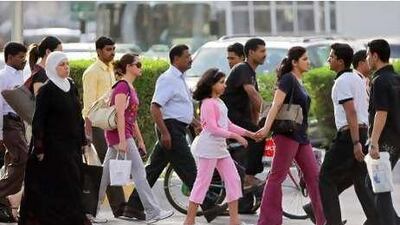Abu Dhabi did not lurch into recession during the global economic turmoil of the past two years, a top official at the Statistics Centre Abu Dhabi (SCAD) said following the release yesterday of the most comprehensive survey ever of the emirate's economy, industrial base, population and labour force. The centre published its 2010 yearbook of about 350 indicators in the emirate, covering economic growth, foreign trade, consumer prices, government finances, industrial activity and the composition of the population.
"If you look at the performance of the labour market and people who are employed, there has not been a recession of any sort," said Peter Crossman, the SCAD's assistant director general for technical affairs. "The emirate has weathered the change in global economic and financial conditions." Data on education, health, crime and culture were also part of the survey, along with a description of the labour force and agricultural sector.
"The statistics are meant to reflect the actual picture of the emirate," said Butti al Qubaisi, the SCAD's director general. While the figures showed a growing number of business registrations and low unemployment, Abu Dhabi's nominal GDP declined by 18 per cent between 2008 and last year to Dh547 billion (US$148.92bn), the yearbook says. Much of that drop was attributable to lower oil prices, Mr Crossman said, and the fact that the SCAD does not compile "real" GDP figures that exclude price volatility to measure actual economic output.
"I emphasise that this [GDP decline] is a price effect," Mr Crossman said. "It's because the valuation of goods and services changes in the price of oil in particular, and because oil is such a large component of the production of the emirate and there is a statistically huge [drop]." The global average crude price declined by 35 per cent to $67 per barrel between 2008 and last year. Crude exports accounted for 57.7 per cent of economic output in 2008 in Abu Dhabi, which sits on about 7 per cent of the world's oil reserves.
The SCAD aims to publish real GDP figures next year that will cover several previous years. Real GDP data will start to appear in 2013, according to a calendar of data releases it distributed in February. Unemployment also remains relatively low, the new statistics showed, with a headline figure of 3.25 per cent in 2008 - the latest data available. About 10.4 per cent of Emiratis were unemployed, while the rate for expatriates was 2.41 per cent. Low unemployment among expatriates is partly explained by the laws governing the labour force: foreign workers are not typically allowed to stay in the country when their employment ends.
Abu Dhabi's imports have more than doubled from Dh35.2bn in 2005 to Dh93.9bn last year, the yearbook says, and came mostly from the US, Germany, Saudi Arabia and Japan. The emirate exported 42.6 per cent of its crude to Japan, 17 per cent to Korea and 11.3 per cent to Thailand. As reported earlier this year, inflation in Abu Dhabi fell to 0.78 per cent last year thanks largely to declining food, clothing and entertainment costs, after hitting 14.88 per cent in 2008. With prices edging lower, the emirate went into a period of year-on-year deflation between July and November of last year.
The SCAD's building materials price index also declined by 7.7 per cent last year, reflecting lower costs for cement, concrete and steel as demand for those goods slackened amid a fall-off in construction activity. Workers' total remuneration rose from Dh77.2bn in 2007 to Dh90bn last year, according to the statistics. Total businesses registered, meanwhile, rose from 62,991 in 2007 to 76,943 last year.
Electricity generated grew from 25.4 million megawatt-hours (mwh) in 2005 to 39.1 million mwh last year. afitch@thenational.ae

